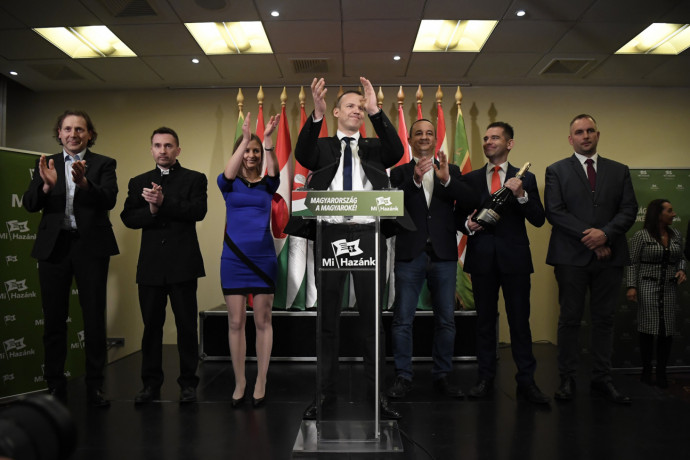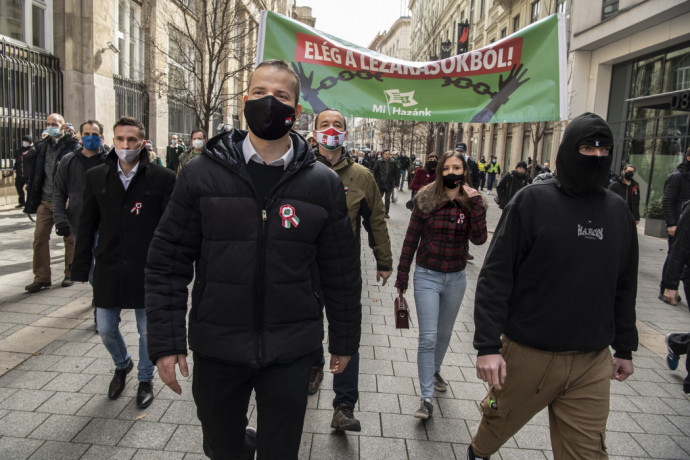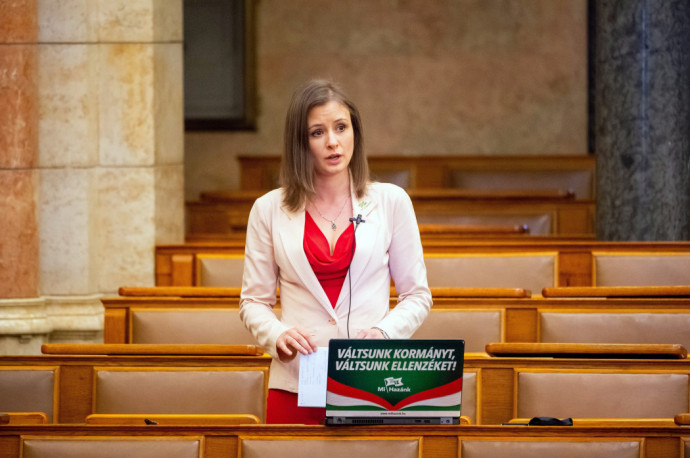Mi Hazánk may help fulfill Orbán’s dream, but it may also bring on a political showdown

The prime minister referred to the fact that the right-wing Mi Hazánk has made it into parliament a novel development, and admitted that for now he isn’t sure what to expect from them. It may not be by accident though, that Orbán has recently often spoken about uniting the nation beyond party lines, and about peaceful disagreement. The position of Mi Hazánk is not an easy one: being a constructive opposition may lead to becoming boring, and choosing a non-conformist approach may lead to taking Fidesz on head-on.
“This is a new situation. If there is anything that is novel to me in these election results, it is this: that something sprung up where Jobbik used to be.”
Even if a right-wing, radical organization gaining strength in a political vacuum was not necessarily surprising, Orbán’s words spoken at his international press conference do reveal that this new situation most definitely requires Fidesz to switch its political strategy.
In the recent past, Mi Hazánk has definitely been an opposition party walking its own path. It was established by the radical politicians of Jobbik, when it began its transformation towards being a “people’s party”. Their departure did not happen lightly – a few were excluded from the party, and at the time spoke about feeling that their party had been betrayed.
This way they at least shared a platform with Fidesz – which had as its main goal the extermination of the opposition about to unite, but especially the extermination of Jobbik and its leader, Péter Jakab. Fidesz found a helper for this in the person of János Volner, who left Jobbik for Mi Hazánk, but then in 2019 left them as well, so he could continue on his own, representing the party named after himself – with him being pretty much the only member.
He was the source of the articles aimed at discrediting Jakab, and he was the one who eventually submitted a proposal to amend the law about the conditions for establishing a country-wide list at the elections, which – in a way which was perfect for Fidesz – forced Jobbik and Gyurcsány’s DK to rely on each other.
Jobbik brought them together
In other words, Mi Hazánk and Fidesz have shared at least one goal, and that was to weaken Jobbik and the leftist opposition parties, and if we take a closer look at their relationship, it is no exaggeration to say that they had a sort of implied non-aggression contract.
Mi Hazánk very visibly avoided attacking Fidesz’ classically sensitive points like the wealth and private life of Antal Rogán, or Viktor Orbán’s family, including the wealth of his son-in-law István Tiborcz, or his father, Győző Orbán, or the huge property under development in Hatvanpuszta.
If one does a search on Dóra Dúró’s Facebook page for Rogán, Mészáros, (Orbán’s childhood best friend, and now Hungary’s richest man) Tiborcz or Ráhel (Orbán’s daughter), it becomes immediately noticeable how restrained the politician became about these issues after 2018.
Especially given that she is a leader in a radical party, it is unusual that instead of her previous, personal attacks, these names only come up in the context of more general criticism under the slogans such as “We demand accountability!” or “Oligarchs should pay extra taxes!” or “The powers of the past 30 years”.
The Fidesz-friendly media had focused its energies on the united opposition, and did not start a discrediting campaign against Mi Hazánk. This is also quite easy to check by looking up – for example – the magazine called “Ripost”, which is an intellectually lower-level player in the propaganda machinery. The last time they wrote about Dóra Dúró was in 2018, and it was to report that someone had compared her to the fart of a horse. It is also hard to find an article aimed at discrediting Dúró on Origo. One must go back all the way to 2018 when they photographed her house to show the luxury villas the Jobbik politicians live in.
It is also true, however, that they were not given a push either: Mediaworks (the gigantic, pro-Fidesz company which owns the majority of Hungarian media outlets) did not permit them to advertise during the campaign, and MediaLOG did not distribute their publication entitled “The third path”.
Instead of pushing the classic topics of the united opposition such as corruption, theft, politicians and their families living the high life, Mi Hazánk was pushing the usual (far) right-wing subjects: the average folk keeping their freedom against the unreliable state (stop mandatory vaccines, stop mask-wearing), anti-LGBTQ rhetoric (shredding a storybook), anti-minority stance (migrants, gypsies), the interests of the nation before its international contracts (criticizing NATO, criticizing the EU) and of course, the unmissable topic of the conspiracies of global powers in the background and the subject of “we know who’s really in control”.

Thus, until now, the operation of Mi Hazánk has been quite comfortable for Fidesz.
- If they so pleased, the governing party could easily steal the sensitive subjects brought up by Mi Hazánk (if their surveys confirmed that it’s worth it). This saved them the trouble of being the ones to risk bringing up something they may need to back out of later on. And Fidesz did just that with the building of the fence, with the anti-LGBTQ talk, and after a while, with the loosening of Covid restrictions too. In case of the book, “Mesország Mindenkié” (“Storyland is for everyone”), it was Dúró and her team who first used the term “gay propaganda”, and when Fidesz saw that this sits well, they made a law proposal out of it.
- Being independent MPs, Dúró and her team did not have many opportunities to speak in Parliament. Even if the party or its politicians said anything extreme, the international press did not pay attention to them, and thus politics did not have to react to them.
- Up until now, it was not realistic that the party which essentially started from zero would grow to a size which would threaten Fidesz.
- They were weakening the united opposition together.
Meanwhile, Mi Hazánk was able to do its thing, and could build itself up without having to fear a Fidesz campaign attacking it. The only thing they had to swallow at times was that every once in a while, Fidesz would steal a topic or two from them.
And now, the big question is what to expect from both protagonists from now on.
It may be perfect for the message of “uniting the nation”
One of the possible directions is to continue in what has characterized the two parties’ relationship so far. This makes what Orbán has often spoken about recently especially important. He has picked up the subject of following “the politics of peaceful disagreement” again, as well as saying that as the winner, his goal and task is to (re)unite the nation beyond party lines. “This can be done with topics which are independent of political preference” – he said at his press conference. In his opinion, gender identity and financial support for families are such subjects – ones on which Mi Hazánk happens to very much agree with Fidesz.
“My task is to try to bring about a unity, an agreement of the entire nation that will be bigger than a two-thirds majority.” – Orbán said
If Fidesz can show that they have a somewhat constructive opposition, which is able to support the government on important issues, then this might make it look like the government is acting for the nation as a whole. They would be able to point to this and say: behold, even some of the opposition agrees with them on some issues, while the united opposition is working against the nation, they are hirelings of the USA and Soros, etc. This would also enable Fidesz to shake the accusation that their will is pushed through parliament in an authoritarian way, with disregard to everyone else.
Based on what we have seen so far, and on the most recent statements from Mi Hazánk, this direction seems quite likely. After the elections, Dóra Dúró said that they “don’t intend to be a tantrum opposition or a visceral opposition”. She added that they will be looking at the content of the proposals, and that they would support anything that is good for the Hungarian people, and reject anything that isn’t.
László Toroczkai used a similar line of reasoning and said that he would love to see bill proposals which the parties in parliament would vote on in unison. “The politics which we have seen recently – the theater which is often entirely unworthy of the nation’s temple, the most beautiful parliament in the world […], is definitely far from me, and will be far from Mi Hazánk” – he said.
Although it may sound peaceful, but this scenario does hold some tension. Mi Hazánk may feel that they need to sing Orbán’s tune about topics which were stolen from them. This feeling is already present. Regarding the storybook issue, Toroczkai told Telex that “they were indignant when Fidesz stole this from them”.
It also does not look too good that the government would receive the support needed for uniting the nation from an unseemly, radical party. This would not bode well in light of Article 7 in the EU, nor in regards to Israel, or the gypsy voters. Due to this, sooner or later, it will be in the interest of Fidesz to put pressure on Mi Hazánk to pull back and forget certain topics like their anti-Israel and anti-gypsy talk, or protests with the ultra-right-wing “Betyársereg”.
There are also likely to be topics in which the government will need support from other parties – should Mi Hazánk think differently about this, it may create further tension.
From the radical party's point of view, the biggest risk is that their current voters may be disappointed after having voted for an outspoken opposition party in order to change government, but then seeing this party regularly voting with Fidesz, playing according to the Fidesz narrative, and leaving off its own strong messages. If this were to play out, the party will not be able to grow, and will remain on the current level, and its base may even erode a bit, thus endangering staying in parliament after the 2026 elections.

Orbán is curious too
The other potential scenario is for the two parties to treat each other entirely as rivals. This would mean that Orbán would not count on Mi Hazánk at all, and Mi Hazánk would continue carrying on its current style of politics even as a parliamentary party. They may even push their well-known messages harder, and possibly move further right – if they think this would guarantee keeping their voter base, or even expanding the same.
This may end up being uncomfortable for Fidesz. They have gone through this once already – with Jobbik – and that gave them a lot of headache: in the season when “Magyar Gárda” (the ultra-right-wing formation) was active, Jobbik won 20 percent of the votes at the elections.
On top of that, it is also possible that after a while, Mi Hazánk may win over some Fidesz voters who are open to their ideas, and in case of a close election this may prove fateful in a few constituencies. All the while, Orbán will have to do some explaining abroad about a parliamentary party saying such things in the Hungarian Parliament.
Fidesz may be forced to take certain steps, and the relationship the two parties have had until now may be disrupted: the attacks against Mi Hazánk may be starting up soon.
Which way the parties will go will be largely influenced by where Mi Hazánk sees a chance for growth: whether they will target Fidesz voters, or the undecided, non-Fidesz voters with no party alliance. This will determine their actions in parliament and whether they will be an opposition party according to Fidesz’ liking.
The two scenarios may also overlap: they may both be popular within Mi Hazánk, causing fragmentation within the party, and may also follow each other. Either way, Mi Hazánk will sooner or later have to face that they will either become insignificant, or will have to take on Fidesz much more strongly than they ever have.
It seems that even Viktor Orbán himself is interested to see which way they will choose. When asked about the party at his international press conference, he said:
“We don’t yet know what kind of power this is, what they will represent, or whether they will pose a threat for minorities – for example. We must wait until their first speeches in Parliament, since this is a new party there.”
The Prime Minister also added that there continues to be zero tolerance regarding antisemitism or being against minorities. It remains to be seen how Toroczkai and his party will receive this message sent to them via the press.
If you found this Telex analysis informative, and want to be sure you don't miss similar content from us, subscribe to the Telex English newsletter!